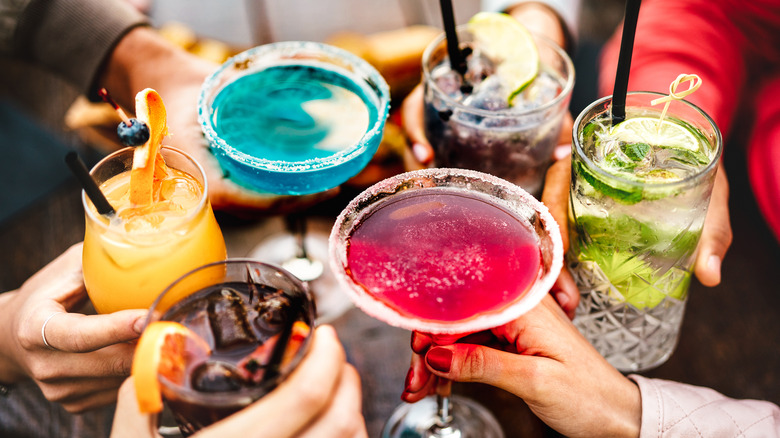Why Do Some People Not Get Hangovers?
Surely, we've all got that one friend who's a bit more resistant to alcohol. Maybe this person can drink like a fish before getting soused or be left with a minimal hangover the next day. But shot after cocktail after beer after whiskey, neat, with no hangover whatsoever? It sounds like magic, and a potentially dangerous door to alcohol dependence. Or you know, maybe your friend has the opposite problem and gets loopy and beet-red after half a glass of chardonnay.
It is, in fact, totally possible for certain blessed (or cursed) individuals to be left without the body's finger-wagging "watch it there, buddy" next-day warning of thundering headaches, nausea while hovering over toilet rims, and cottonmouth. Granted, some folks are more sensitive to their own body or have higher sensory thresholds for detecting inner abnormalities (officially called "interoception," via Habits for Wellbeing). They might have cottonmouth, for example, but not notice because it's not bad enough, or if they do notice, they don't care because of a tolerance for discomfort.
A lot of factors influence overall hangover severity, such as general health, type of drink, how much water concurrently drunk, quality of sleep after the fact, and more, as discussed in The Independent. The greatest factor of them all, though, as Dr. Amy Shapiro says in Well and Good, is blind genetic luck regarding the metabolism of acetaldehyde, the toxic by-product of alcohol produced in the liver. If your body manages to get rid of it quickly enough, congratulations: no hangover.
A toxic self-cleaning process
Let's dig a bit deeper into how hangovers actually function. It's not the alcohol itself that causes hangovers. In other words, the sensations associated with hangovers — nausea, headaches, the shivers, etc. — aren't caused by alcohol somehow still circulating in the blood hours and hours after you've finished drinking. It's all been metabolized by then. While there are still some questions about the exact chemical transfers that compose the entire hangover-producing process, as Smithsonian Magazine explains, the key component is the aforementioned chemical, acetaldehyde.
As your body rushes to rid itself of your attempts to poison it, it produces acetaldehyde, which itself needs to be metabolized. But acetaldehyde — your body's temporary cleaning by-product — is 30 times more toxic than alcohol itself. When acetaldehyde builds up and can't be metabolized quickly enough, it causes the sensations folks know as hangovers, or "veisalgia" by its official name. Other contributing factors, such as insufficient quantities of another enzyme( NAD+), a deficient amount of glucose in the body, or alcohol's diuretic properties (it dehydrates the body), have been found less critical in producing hangovers than acetaldehyde.
As Frontiers in Neuroscience explains, there are two key enzymes involved in the production and removal of acetaldehyde: alcohol dehydrogenase (ADH) and aldehyde dehydrogenase (ALDH). ADH converts alcohol into acetaldehyde, and ALDH converts acetaldehyde into acetic acid (a much slower process), which you can urinate straight into the toilet. The more top-notch this entire process, the less severe the hangover.
Unchangeable genetic fate
As Well and Good sites of a 2014 study available on the National Library of Medicine, research indicates that genetics account for the majority of hangover severity. In men, genetic factors account for 45% of the body's ability to metabolize alcohol, and in women, they account for 40%. This is true regardless of behavioral changes such as having more water while drinking, slowing down towards the end of the night, giving yourself time to even out before sleeping, etc.
Genetics also accounts for people who tend to get red fairly quickly when drinking. Ironically, this phenomenon is due to greater efficiency in converting alcohol to acetaldehyde, meaning these individuals' livers produce greater amounts of the enzyme alcohol dehydrogenase (ADH). But this just creates a greater surplus of acetaldehyde in the body, which, as stated, metabolizes more slowly and is dependent on a different enzyme, aldehyde dehydrogenase (ALDH). These folks are, essentially, walking toxic bags until the acetaldehyde goes bye-bye.
So what does this all mean? By luck of the draw, some people will experience the most minimal hangovers possible, if at all, just as genetic fate determines the shape of one's jaw, how quickly one gains muscle, and the strength of one's tooth enamel. For the rest of the unblessed (or uncursed), there's no recourse but to act within your limits and, if necessary, sip very, very slowly while not getting jealous of the liquor-soaking beasts partying around you.


